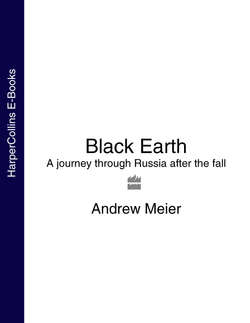Читать книгу Black Earth: A journey through Russia after the fall - Andrew Meier - Страница 32
TEN
ОглавлениеTHE CREEK WAS DARK green and cloudy. As Issa and I bathed in it, resting our hands on the sludgy rocks below, our feet and arms stirred the water the color of burned sugar. Issa was telling me tales of the glory of his youth in Grozny, but I was preoccupied. I was wondering what else lay in the mucky creek of Shali.
We walked here together, through the nettles of the overgrown orchard that was the backyard of the small house where Issa’s mother and two sisters lived. His mother was eighty; his sisters were in their fifties. Throughout the years of war, Shali, lying in the plains just south of Grozny, had been spared the wholesale destruction of the capital and nearly every other town and village in Chechnya. Issa’s mother and sisters lived here throughout the shelling, the bombings, and the military sweeps.
Inside the house it was dark and cool. There were two rooms and a kitchen. Issa did not say it, but the house was all he had in Chechnya now. Once he had a comfortable apartment in Grozny, but it was lost to the first war. He managed to save some of the furniture – a gold-rimmed mirror, a lacquered table, a velvety divan – vestiges of the Chechen elite of the Soviet era that now sat like islands in the biggest room of the house. Except for the salvaged treasures, the house was empty. The second room was filled with rolled-up carpets and chairs stacked against a wall, more remnants of a lost life.
The creek, no matter what toxins of war lay in its waters, was cooling. Like the children who jumped into it, we were naked to our underwear. Our shirts and trousers, stiffened with dirt and road dust, hung from a low cherry tree that twisted above the muddy bank. One side of the creek was lined by the overgrown yards. The other was a steep bank the children used as a diving platform. Behind them were only empty fields. The children leaped in, hands over knees, shouting as they fell through the air.
In the evening, after we dried ourselves with worn hand towels and dressed again in the same clothes, Issa’s mother, Sabiat, took me on a tour. She was so thin and her back so bent that it was remarkable she could walk, let alone cook and clean. “We have everything here,” she said, pointing to the trees that stood amid the weeds: “Apricot, pear, apple, cherry.” The heat of the afternoon brought the smell of the fruit close. Sabiat squinted at the cloudless sky. “Why?” she asked. She needed no more words; she meant the war. “Somebody must want it,” she said.
Everywhere there was greenery. Vines climbed high along the back wall. On a tall wooden fence, roses, pink and red, bloomed. The garden, Issa’s mother said, was all she needed now. Nothing more. “But the fruit of the trees,” said Issa’s younger sister, “is not as good since the war.” She was called Zulei, and her elder sister Zura.
The courtyard, the summer living room of houses across Chechnya, was clean and quiet. Here the routine of the day unfolded. In the morning the sisters washed clothes in metal basins. In the afternoon their mother fried potatoes and boiled lamb. And in the evening Shvedov lounged on a faded threadbare couch that sat in the middle of the narrow porch. Above the porch, in the corners of its slanting roof, swallows nested.
“Our mama’s life has been a hard one,” Zura said.
“Mama,” Issa commanded, “tell him about the deportation.”
There was no need, and he knew that. The deportation was not history. It informed the daily conversation in Chechnya. Issa’s mother had been twenty-two in 1944. She remembered clearly how the NKVD soldiers had herded them into the freight cars – in all, more than fourteen thousand cars were needed – and sent them off to the remote Soviet republics of Central Asia. Along with hundreds of thousands of Chechens and Ingush, Sabiat survived thirteen years in Central Asia. Exile was hard, of course, she said. But it was better, much better, than this war. “They gave us a small plot of land and a little house. We could grow a garden.”
Tired of talk, Sabiat went back to her chores. In her slippers and a flowered cotton dress, she reached for a short brush, a dozen switches tied to a stick. She was intent on sweeping the dirt from the concrete of her courtyard. She stooped low and, despite the heat, worked the brush with purpose and without pause.
“Every night and every morning our mama cleans,” Zulei said. “Only the water from the well will she let us get ourselves.”
She had survived Central Asia, the road back to Grozny in 1957, and the loss of her husband, to a car accident years ago that came on the Prophet’s birthday. “She must work or else …” said her daughter Zura.
As Issa’s mother swept, Shvedov stubbed out another papirosa in the tin coffee can on the sofa. After he got up slowly from the old couch and disappeared into the coolness of the house, Sabrat continued to sweep. A month later Issa would call and tell me that his mother’s heart had at last given out.
